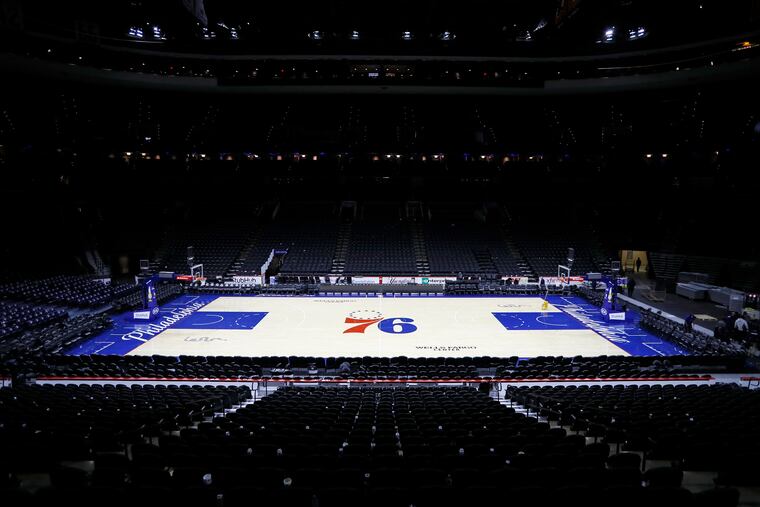U.S. still trails pre-COVID peak in jobs and economic activity, and the new president may not matter
From Wall Street and Broad Street, stock watchers say the U.S. economy has come most of the way back from March, but it won't reach pre-COVID employment levels until there's a vaccine.

The U.S. economy shrank by nearly one-third during the three-month period ending in June. The economy recovered about four-fifths of that loss by August, according to the Glenmede Recovery Index, which tracks bank card payments, business accounts, and Google Mobility data. But the nation has since stalled at that point, remaining at recession levels, with unemployment double the pre-virus rate.
“The pandemic remains in a reopening phase. On a near-term basis, we’re not getting a full recovery because of the lack of vaccine, the lack of herd immunity,” said Jason Pride, chief investment officer at the private-wealth group of the Philadelphia-based Glenmede, which invests $40 billion for clients. “Until we do” — Pride expects effective, widely available vaccines by mid-2021 — “there are holes that need to be plugged.” That means more government money for the unemployed and forgivable business loans.
Keefe Bruyette & Woods, a New York investment bank, has a “KBW Restoration Index” (corrected) that also pegs recovery at about 80% of the business that vanished in March.
Recent signals are mixed. Frederick Cannon, Keefe’sglobal director of research, added in a research note on Thursday: “Airport traffic was up 6% in the week” but is still down more than 60% since before the virus. OpenTable reservations rose 4% but were still down nearly 40% from the pre-virus peak. Electric output and mortgage applications were off, as jobless claims rose.
But these Wall Street pros say that whoever wins the presidency might not make much difference to the U.S. economy, if the stock market, which tends to rise and fall with the prospects of corporate profit, is any sign.
As the AllianceBernstein strategists note, since at least the 1960s, “the party affiliation of the U.S. president has had almost no impact on stock returns, no matter which party’s president occupied the White House.”
Nor do they expect a big variation this time: If Donald Trump is reelected — even with a partly hostile Congress — today’s “expansionary fiscal policy would probably stay in place.” If Joe Biden wins, the government might reverse Trump’s corporate and high-income tax cuts, “but fiscal policy would probably remain expansionary.”
It’s a similarly mixed bag at banks, which are bringing in record deposits. But at big lenders such as Wells Fargo & Co. and TD Bank, loans are up only modestly in comparison, FDIC data show. It’s a sign that consumers and businesses are hoarding cash, while lenders and borrowers aren’t yet betting on a full recovery.
And bank share prices are way down, to about where they were in the Great Recession, as a percentage of bank profits and asset values. “Many investors are fearful of embedded loan losses” that have not yet gone on banks’ books, a team of financial analysts led by Chad Hull told clients of West Conshohocken-based Boenning & Scattergood in a recent report.
Government spending — what economists call “fiscal policy — is the key to recovery,” wrote Paul Gruenwald, chief global economist at S&P Global Ratings, in a report to clients earlier this month.
He expects the U.S. economy will shrink 4% this year, then grow as a recovery builds next year “about 2.5%,” closer to the recent (and, many economists say, sluggish) long-term average, in 2022 and 2023.
Meanwhile, the Treasury’s record spending, including direct payments to businesses and individuals, is fueling record deficits. The central bank is using public funds to buy mountains of public and private debt, inflating investment prices. The president has imposed import taxes to prop up failing industries and threatened prosperous tech companies with sanctions if they help his political foes or don’t help his friends.
The “shift to populism” has moved both parties away from free enterprise, free trade, and the balancing of public spending with tax revenues. The effort has been “fueled by income inequality,” and the resentments that have simmered, as the top 10% of U.S. incomes doubled while half the population’s earnings have been flat over the 40 years since Ronald Reagan was elected president, warn Richard Brink and Walt Czaicki, senior investment strategists at AllianceBernstein.
Looking ahead
Promoters of the three-year-old, 327-seat Uptown! Knauer Performing Arts Center in the historic former West Chester Armory are among the area live-venue backers working to maintain enthusiasm for live shows (remember those?) as the pandemic drags.
On Tuesday, 7 p.m., Moody’s Analytics chief economist Mark Zandi will connect online from his nearby office with Hal Real, founder and chief executive of World Cafe Live (and a leader of the National Independent Venue Association) for an online discussion on “the economic toll the pandemic has placed on the performing arts industry” and the likely impact of the election on their business.
Chris Hanning, dean of the Wells School of Music at West Chester University, will emcee at the vacant center, reminding us how it looks, and take questions from the live chat. More at https://www.onthestage.com/show/uptown-knauer-performing-arts-center/uptown-speaker-series-the-pandemic-the-economy-and-the-future-of-live-entertainment-81958.